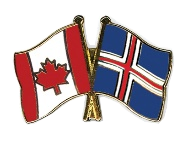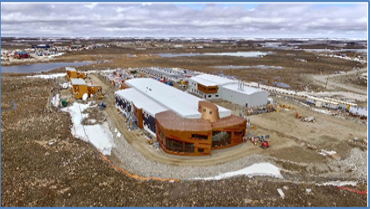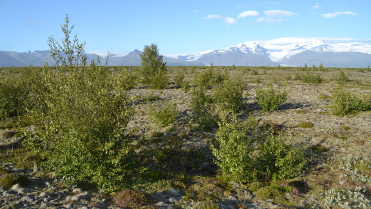Call for Applications

Canada-Iceland
Arctic Research Exchange Program
- Student Funding -
What: An Arctic research exchange pilot program between university students in Canada and Iceland
Where: The Canadian High Arctic Research Station (CHARS) campus in Cambridge Bay, Nunavut and University of Iceland in Reykjavik, Iceland
Who can apply: Masters or PhD students attending universities in Canada or Iceland
Included: Travel to Cambridge Bay and Reykjavik, and accommodation, are provided free of charge
Timing: 3-6 weeks at each location, with both placements to take place between June and December, 2018; exact month is based upon applicant’s preference
Deadline to Apply: April 12, 2018
Introduction
To encourage pan-northern research collaboration and foster Canadian-Icelandic Arctic research cooperation, Polar Knowledge Canada (POLAR) and University of Iceland, are offering students the opportunity to take part in an exchange program between the Canadian High Arctic Research Station (CHARS) campus in Cambridge Bay, Nunavut, and University of Iceland in Reykjavik, Iceland. Selected students will conduct research projects of their choice and develop stronger linkages between Canadian and Icelandic research institutions. The “Canada-Iceland Arctic Research Exchange Program” is building off of the Letter of Understanding between Polar Knowledge Canada and the Icelandic Arctic Cooperation Network and the Agreement on Enhancing International Arctic Scientific Cooperation signed by the Arctic States at the Arctic Council Ministerial Meeting in Fairbanks, Alaska.
The CHARS campus is located in an Arctic tundra ecozone, while Iceland’s field sites span diverse habitats ranging from permanent ice fields, to Alpine tundra to boreal birch forests. Combined, the Canadian and Icelandic stations and sites provide an opportunity for comparative studies under different climatic regimes.
The Research Stations


The CHARS campus is located in Cambridge Bay, Nunavut (69°N). The campus is a year-round world-class hub for science and technology in Canada’s North and a major node in the network of national research infrastructure across the North. The CHARS campus consists of a Main Research Building, a Field and Maintenance Building and triplex accommodation units that can accommodate 44 visiting researchers. The research campus will provide a broad range of services, including a technology development centre, mechanical and electrical workshops, a knowledge-sharing centre, and advanced laboratories. The CHARS campus will have office and laboratory space to host visitors. POLAR staff can provide general logistical support as well as equipment for scientists going into the field and working in the research labs. Cambridge Bay, with a population of approximately 1,700, has all the necessary amenities, including a bank and a post office, grocery stores, several churches, restaurants, and companies for vehicle rentals.
The University of Iceland is located in Reykjavik, Iceland. The University employs over 1,300 staff, and has over 14,000 students. The exchange is funded by the University of Iceland Arctic Initiative. The University is comprised of five schools, and the exchange student will be hosted by the Environment and Natural Resources (ENR), an interdisciplinary graduate program within the School of Engineering and Natural Sciences enabling collaboration with all departments within the School. University staff throughout the School will provide support as well as enable participation in active research projects. The research campus provides a wide range of opportunities including a wide range of laboratories (ranging from geography, earth sciences and biology to engineering) and field stations all around Iceland, in addition to opportunities to link field observations, remote sensing and historical data. The following descriptions are a small example of available field opportunities:
- Skeidararsandur Research Site; an example of current onsite research is examining the colonization of birch.
- Icelandic Highlands Research Sites Audkuluheidi and Theistareykir; an example of current onsite research is monitoring tundra responses to climate change and grazing.
- Institute of Earth Sciences multiple research sites where some current research, for example, focuses on the impact on avalanches as permafrost thaws; glacial melt; environmental change such as impact of melting glaciers on sea-level rise, landscape appearance and travel
- University of Iceland research centers around the country, including Hornafjordur research center that focuses on research in Vatnajokull national park linked to tourism, the research center of the Westfjords that focuses on research on marine resources, Husavik research center that focuses on marine mammals and the Research center of the South that focuses on research linked to land-use and biodiversity
The Exchange Program
The exchange program is directed towards Masters or PhD students with an interest in science and technology projects that align with at least one of the priorities listed in the table below. The selected candidates will conduct their proposed research projects at both research stations. Note that applicants’ projects need not align exactly with those proposed from the other country; the idea is simply that successful candidates have the opportunity to enrich their own research by conducting it in two northern locations, and that they potentially benefit from collaboration with another research team. Selected candidates will receive access to each station’s regular research services (laboratories, staff support, etc.), and accommodation and travel expenses will be covered to the CHARS campus and University of Iceland for both the domestic and international field work placement.
| POLAR’s Science and Technology Priorities |
|---|
| Alternative and renewable energy for the North |
| Improved northern housing infrastructure or waste management infrastructure |
| Ecosystems monitoring |
| Predicting the impacts of changing ice, permafrost or snow on shipping, infrastructure or communities |
Timing
Research and/or field work at the stations can be conducted at any time between June and December 2018, according to candidate preference. Duration of research/field work placements will be 3 to 6 weeks, depending on the research being conducted and availability of facilities and accommodation.
Who Can Apply?
Masters students and PhD students enrolled in a university in Canada or Iceland are eligible to apply. Applicants from Canada must submit their applications to POLAR at info@polar.gc.ca. Applicants from Iceland must submit applications to (Environment and Natural Resources at umhverfi@hi.is with a clearly marked subject heading “Application for Arctic Research Exchange Program”). Applications must be submitted in English. Questions regarding the exchanges can also be directed to these email addresses.
Applicants may identify a potential exchange partner in their applications, or may apply with their own research project. One candidate from each nation will be selected for the 2018 program.
How to Apply
Applications will be selected upon the following criteria:
- Field work experience in the Arctic or sub-Arctic, or involvement in Arctic or northern research
- Project alignment with one of the above science and technology priorities
- Availability to participate in two research placements (one in each country)
Considered an asset
- Willingness to include student from the other country in the project’s field campaign, if there is interest on the part of the visiting researcher
- Experience with community engagement
- Proposed projects that involve a local community in the research process and/or science communication are considered strong assets.
For Canadian applicants only, preference will be given to northern-based and/or Indigenous applicants. However, all applicants are encouraged to apply.
What to include in application?
The application should include:
- Completed application form
- Research plan (maximum 3 pages) containing sections on:
- Research interests
- Outline of research project and field work plan in applicable, and how the project will benefit from taking place at both research stations
- Research funding currently or potentially assigned, if applicable
- Researcher’s northern or Arctic field experience
- Resume of student
- Letter of support from supervisor or project leader
Applications must be received not later than April 12, 2018. Canadian applicants must submit to info@polar.gc.ca and Icelandic applicants to umhverfi@hi.is.
Polar knowledge Canada (POLAR) is a Canadian government agency established on June 1st, 2015. POLAR’s mandate is to advance Canada’s knowledge of the Arctic and strengthen Canadian leadership in polar science and technology.
University of Iceland is a public international research university established in 1911. Icelandic Arctic Cooperation Network is a multi-stakeholder Arctic network involved in fostering cooperation among public and private institutions.